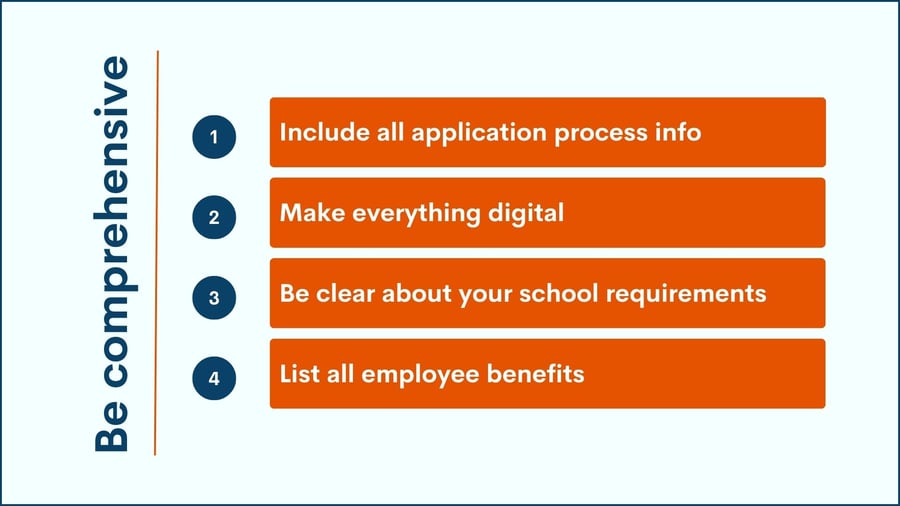If your school has teacher vacancies you’re trying to fill, you may have discovered that it’s more difficult than it was in the past. While a big reason is the ongoing teacher shortage, educator shortages also contribute significantly to this difficulty. It’s also a problem of getting qualified teachers to the right openings. If the teachers don’t know about or can’t find vacancies that would be great for them, that leads to a dead end where no jobs will be filled. In addition, if position requirements or benefits are not clear, it can discourage teachers from applying. School districts are implementing innovative solutions to attract and retain teachers, such as flexible school weeks and financial assistance.
The Brookings Institution observes that the immediate problem of positions going unfilled jeopardizes a school in many ways. Lingering vacancies create a cascading effect of increased class sizes, canceled course offerings, hiring of uncertified individuals for open roles, and decreased student achievement. These outcomes can make a school’s quality and reputation suffer, exacerbating the original problem and making it even harder for school districts to attract teachers.
Most schools have historically focused their marketing efforts on attracting students and parents rather than educators. They’ve often had their pick of teachers, with many qualified local candidates applying for open positions. With the decreasing supply of teachers, it’s getting harder and harder for schools to attract the right candidates and find a good fit for their teaching vacancies.
In some cases, it’s a teacher’s market, with qualified teachers having their pick of the best openings. Some schools are even having to market themselves to teachers who don’t live nearby, flying teachers in for interviews and assisting new hires with relocation.
Fortunately, there are several tools and strategies schools can use to improve their recruitment process. Putting some extra thought and effort into your job listings could mean all the difference in snagging the best possible candidates for your open positions.
Table of Contents:
- Get the word out far and wide with school marketing
- Make it easy for teachers to apply for teacher vacancies
- Make it pretty and friendly
- Be comprehensive
- Filter in, filter out on education job boards
- Put yourself in teachers' shoes when creating your job posts to address teacher shortage

Get the word out far and wide with school marketing
Make sure that job postings for your open roles appear on multiple sites. Utilizing effective marketing strategies is crucial to ensure these job postings reach a wide audience. These include education association websites for your state, education-specific sites like SchoolSpring and TeachingJobs, sites that specialize in non-profit employment, like Indeed and FoundationList, and more general job boards like LinkedIn and ZipRecruiter. Effective job postings can also attract attention from prospective students and their families, ultimately impacting enrollment numbers.
.png?height=2000&name=Searchality%20download%20report2%20(1).png)
Is Your School’s Marketing Strategy Helping or Hindering Your Ability to Attract Top Teaching Talent?
Make it easy for teachers to apply for teacher vacancies
On your own school association website, you’ll want to create a landing page for a dedicated section of job postings that is easy to navigate. It is crucial to comply with the Americans with Disabilities Act (ADA) to ensure the application process is accessible to all candidates. Make sure the job descriptions, requirements, and application instructions are crystal clear, error-free, and without redundancies. You want to avoid making candidates wade through unnecessary or confusing content. Make it easy for them! Before you click “publish,” go over posts with a fine-tooth comb and then have a colleague or two double check them.
Make it pretty and friendly
Along with flawless content, your website interface should be visually appealing, intuitive, and user-friendly. Maintaining active social media accounts is also crucial to enhance the school's digital presence and attract potential candidates. Ensure that the website works well on mobile devices, since these days many teachers use smartphones or tablets for their job search.
Be comprehensive
The Texas Computer Education Association blog includes a handy checklist of four important things to remember for your teacher job postings:
- Include all application process info, including required documents and deadlines.
- Make everything digital, including form uploads, to save candidates time.
- Be clear about whether your school has requirements beyond the classroom, like attendance at open houses or extracurricular events.
- List all employee benefits, so applicants know the total compensation beyond just salary.
Educator preparation programs play a crucial role in ensuring candidates are well-prepared for their roles.

According to the National Education Association, the conditions underlying the shrinking pool of educators include burnout, low pay, and the accompanying general decline of education as a desirable career. By using this checklist, you’re anticipating what’s most important to teachers. Some candidates will be those who already have teaching jobs and are looking to make a switch. They are guaranteed to be busy and needing a streamlined and easy experience. High-quality professional development and ongoing learning opportunities are essential for teacher retention and enhancing student outcomes.
Filter in, filter out on education job boards
With so many openings to choose from, teachers hunting for jobs can curate their employment search criteria to match precisely what they want. Key strategies in developing an effective job search function include creating a comprehensive plan that addresses various channels to improve outcomes. Your search function should allow them to easily find job postings that are relevant to them.
Make sure your job board has integrated filtering to help teachers search for that perfect role. Some recommended filters include:
- Geographic location
- Part- or full-time jobs
- Temporary or permanent
- Subject matter
- Expertise level
- Required credentials


-1.png)
